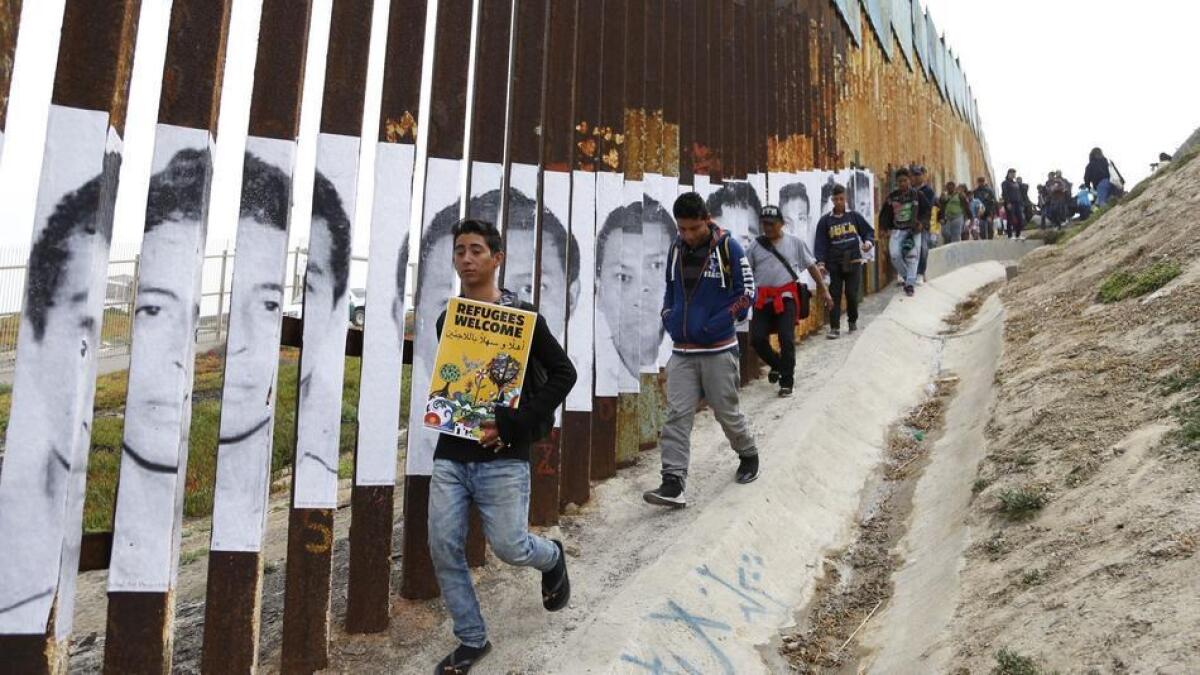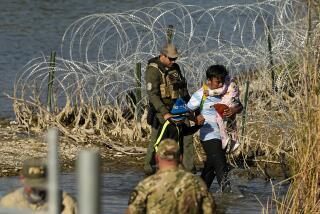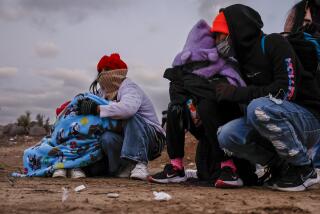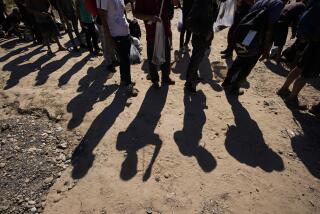Are federal prosecutors targeting Central Americans who cross the border illegally?

It was just after 9 p.m. on April 27 when Border Patrol Agent Jamie Renteria spotted a group of 18 people walking north from the fence that marks the international border between the U.S. and Mexico in an area called Goat Canyon.
Within a few minutes, Renteria had arrested all of them — 13 from Honduras, one from Guatemala, one from Mexico and three from India. A few hours earlier a second, smaller group of seven was arrested by another agent not too far away.
The arrests were not unusual for a Friday night at the border. But since the arrests, which came as a a caravan of Central American migrants arrived at the border in Tijuana, a legal battle over some of those who were charged with illegally entering the country has been shaping up in San Diego’s federal court.
At issue is the claim from 11 people facing charges of illegal entry into the U.S., typically a routine misdemeanor charge, that they are being singled out for prosecution by the Justice Department because they are from Central American countries.
Lawyers for the defendants said that others arrested in the same group, such as the three from India, are not facing charges. Such selective prosecution is unconstitutional — and also flies in the face of the Trump administration’s publicized vow of “zero tolerance” for any illegal border crossers — regardless of the country they came from, the lawyers argue.
The case is scheduled for a key hearing next week. Federal prosecutors in court papers deny anyone was singled out because of where they are from, but instead argue that the defendants were trying to “cut the line” of other caravan members, who were planning to seek asylum at ports of entry.
The government said that public statements by Department of Homeland Security officials and the Border Patrol warned that asylum seekers from the caravan would be accepted — but those trying to sneak in illegally would be prosecuted.
Defense lawyers want the charges dismissed entirely.
To bolster their case, they point to public statements from the administration — tweets from President Trump and a series of statements from Atty. Gen.Jeff Sessions — that they say show a specific targeting of Central American immigrants.
“The government cannot choose its defendants based on their alleged country of citizenship, but that’s exactly what it did here,” Eric Fish, a federal public defender, argued in court papers on behalf of one of his clients, Olga George.
The 31-year-old Honduran woman came to the border with her four minor children, seeking asylum, Fish said.
The court battle is unusual in what are normally open-and-shut illegal entry cases. The overwhelming majority end up with quick guilty pleas. A first offense carries a sentence of up to six months in prison, though defendants who don’t have prior offenses are usually offered a deal where they are credited with time served since their arrest, and are soon deported.
In court papers the government contends that those who were arrested were all part of a caravan of more than 200 migrants that came north through Mexico to Tijuana, intending to seek asylum in the U.S. In the weeks before the caravan arrived, both Trump and Sessions made public statements about the caravan that Fish contends show that only Central Americans were targeted.
He quoted a Trump tweet from April 3 warning of “the big Caravan of people from Honduras” heading toward the border. Similarly, Sessions in an April 23 news release referenced the “so-called ‘migrant caravan’ which press reports indicate consists mostly of Honduran nationals.”
Coupled with those statements was a memo Sessions issued on April 6 ordering federal prosecutors on the border to adopt a “zero tolerance” policy and prosecute anyone arrested for misdemeanor illegal entry.
Prosecuting only those from Central America and not the three people from India undercuts the zero tolerance stance, Fish argued, and, coupled with the public statements, shows the discriminatory intent behind the prosecutions.
He further argued that it’s unclear exactly how the government determined those who were criminally charged were from the caravan. George, court records show, did not tell the agent she was a member of the caravan.
Government lawyers countered that the prosecutions were not selective but were targeted at people who illegally entered the country and then claimed asylum. That was unfair to caravan members who waited, many for days, to apply for asylum at the port of entry. Filing charges against people who jumped the line also acted as a deterrent, lawyers argued.
The three Indian men who were caught with George were not prosecuted simply because they were not members of the caravan, the government contends.
“A prosecution of the Indian nationals offers no pointed deterrence toward the hundreds of caravan members assembled near the port of entry,” Assistant U.S. Atty. Michael E. Lasater wrote.
In addition, he noted that one non-Central American caught with George, a Mexican man, was also prosecuted, which the government argues undercuts the claim of selective prosecution.
Moran writes for the San Diego Union-Tribune.
More to Read
Start your day right
Sign up for Essential California for news, features and recommendations from the L.A. Times and beyond in your inbox six days a week.
You may occasionally receive promotional content from the Los Angeles Times.






